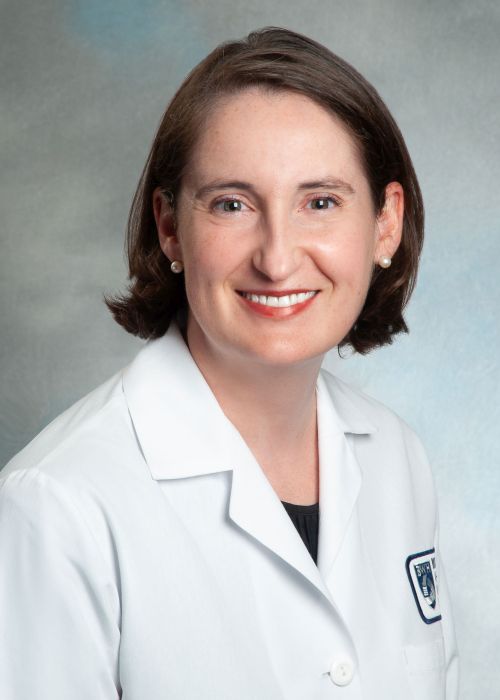Cardiovascular Psychiatry: Part 2
 Margo C. Funk, MD, MA, FACLP.
Margo C. Funk, MD, MA, FACLP.
Director of Cardiovascular Psychiatry, Vice Chair for Education, Residency Program Director, Department of Psychiatry, Brigham and Women’s Hospital, Boston, MA.
Dr. Funk has disclosed that in 2021, she received fees as a consultant for Acadia Pharmaceuticals. Dr. Aiken has reviewed this educational activity and has determined that there is no commercial bias as a result of this financial relationship.
“About half of older adults with depression have evidence of a vascular contribution [to the mood disorder] on MRI, and the rate goes up with age.”
TCPR: I understand depression worsens cardiovascular disease, but cardiovascular disease can also cause depression. Tell us about this “vascular depression.”
Dr. Funk: The idea here is that people with microvascular disease have lots of small ischemic injuries to the brain that build up and cause depression. Vascular depression is actually quite common in older adults and those with cardiovascular risk factors like hypertension, dyslipidemia, diabetes, as well as inflammation—anything that disrupts the vascular system. You can also see vascular depression in people with preexisting mood disorders because, like you said, the causation runs both ways. Cardiovascular disease is more common in mood disorders and starts earlier—six years earlier in major depression and 17 years earlier in bipolar I (Goldstein BI et al, J Clin Psychiatry 2015;76(2):163–169).
TCPR: How do you know if a patient has vascular depression?
Dr. Funk: Consider it if they are over age 50 and have cardiovascular risk factors like hypertension, diabetes, dyslipidemia, arterial disease, or stroke—any place where you’re seeing an insult to the vasculature. About half of older adults with depression have evidence of a vascular contribution on MRI, and the rate goes up with age (Park JH et al, J Affect Disord 2015;180:200–206).
TCPR: What would you see on an MRI?
Dr. Funk: An MRI is not necessary to diagnose vascular depression, but if you have one, it is worth looking at. I would look for diffuse microvascular disease or white matter abnormalities. The summary might read “normal for age,” but the full report may indicate those findings.
TCPR: How do you treat vascular depression?
Dr. Funk: It is not easy. Antidepressants do not work well in these cases, so you may have to try other approaches. The first thing is to make sure they are addressing the vascular disease not just with medication, but also with lifestyle (like physical activity) and a healthy diet (eg, Mediterranean diet, low-cholesterol diet, or the DASH diet for hypertension). After that, electroconvulsive therapy and transcranial magnetic stimulation have some evidence (Jellinger KA, J Neural Transm (Vienna) 2022;129(8):961–976).
TCPR: What do psychiatrists need to know about pacemakers and other cardiac devices?
Dr. Funk: First, find out what they are used for. Pacemakers are usually implanted to correct a low heart rate. Implantable cardioverter-defibrillators (ICDs) are there to terminate a potentially lethal arrhythmia that is shockable. ICDs also have pacemaking function. If someone develops torsades de pointes (TdP), the ICD will shock them out of it, but you’d still need to do something to address the underlying cause of the TdP.
TCPR: What is it like to live with an ICD?
Dr. Funk: It can be frightening. Many people with ICDs implanted for secondary prevention have already experienced a cardiac arrest. These patients are at risk for depression, anxiety, PTSD, and worsened quality of life. Their ICD can go off at any time to treat a dangerous rhythm. In some cases, it can fire multiple times, called an “ICD storm.” This is extremely painful and scary, and patients often have PTSD as a result. These storms may be from inappropriate sensing or from actual cardiac events. So, while the ICD may treat an episode of TdP, it won’t prevent it and can certainly result in psychological trauma. A useful scale to screen for ICD-associated anxiety is the Florida Shock Anxiety Scale (Kuhl EA et al, Pacing Clin Electrophysiol 2006;29(6):614–618).
TCPR: What is cardiac resynchronization therapy (CRT)?
Dr. Funk: You’ll see CRT used in congestive heart failure. It is an implanted electronic device that paces both sides of the heart to reduce strain. These devices can also have a defibrillation function (called a CRT-D) that operates like an ICD, with the risk of traumatic ICD storm.
TCPR: Thank you for your time, Dr. Funk.
Newsletters
Please see our Terms and Conditions, Privacy Policy, Subscription Agreement, Use of Cookies, and Hardware/Software Requirements to view our website.
© 2026 Carlat Publishing, LLC and Affiliates, All Rights Reserved.


_-The-Breakthrough-Antipsychotic-That-Could-Change-Everything.webp?t=1729528747)



